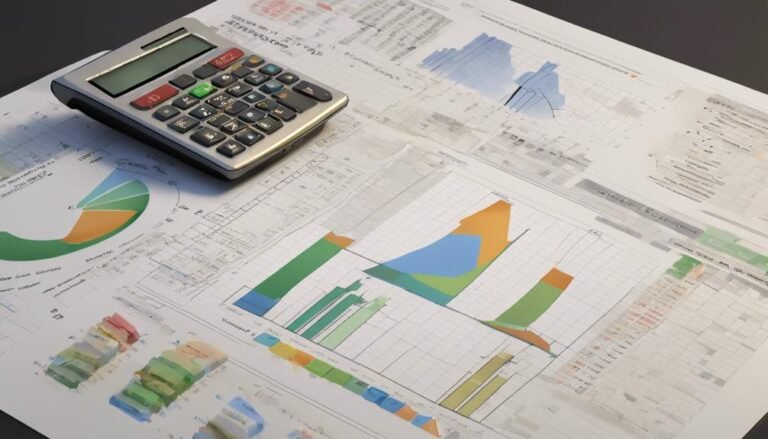Budgeting Basics for Effective Financial Management
Master budgeting basics for effective financial management by setting clear financial goals, tracking income and expenses, and creating a budget plan aligned with your objectives. Identify spending habits, adjust for financial changes, and implement tips like the 50/30/20 rule for success. Understanding these fundamentals is essential in achieving financial stability and laying a strong foundation for your future financial well-being. A solid budgeting framework will empower you to make informed decisions, manage your finances efficiently, and reach your financial goals effectively. Start mastering these basics today to take control of your financial future.
Key Takeaways
- Establish clear financial goals for direction.
- Track income and expenses diligently.
- Create a detailed budget plan aligned with goals.
- Identify and control spending habits.
- Review and adjust budget regularly for success.
Importance of Budgeting
Understanding the importance of budgeting is essential for effective financial management. Budgeting allows you to plan and track your income and expenses, helping you allocate your money wisely. By creating a budget, you can identify saving strategies that work best for you, whether it's setting aside a portion of your income each month or cutting back on non-essential expenses. One vital aspect of budgeting is establishing an emergency fund to cover unexpected costs or financial setbacks. Having a safety net in place can provide peace of mind and prevent you from going into debt during challenging times.
To assist in the budgeting process, there are various budgeting tools and financial apps available that can help you organize your finances, track your spending, and set financial goals. These tools can automate the budgeting process, provide detailed insights into your financial habits, and offer suggestions on how to improve your financial situation. Utilizing these resources can streamline your budgeting efforts and make it easier to manage your money effectively.
Setting Financial Goals
To effectively manage your finances, it's essential to set clear and achievable financial goals. Goal setting provides you with a roadmap for your financial journey, helping you stay focused and motivated. Start by defining your short-term and long-term financial objectives. Short-term goals could include building an emergency fund or paying off credit card debt, while long-term goals may involve saving for retirement or buying a home.
Once you have established your financial goals, it's vital to develop saving strategies to reach them. This could involve creating a budget to track your income and expenses, identifying areas where you can cut costs, and setting aside a portion of your income for savings each month. Consider automating your savings by setting up automatic transfers to a dedicated savings account.
Tracking Income and Expenses
When tracking your income and expenses, categorize your transactions to gain a clear understanding of your financial flow. Income tracking involves recording all the money you receive, whether it's from your job, side gigs, investments, or other sources. By categorizing your income, you can see where your money is coming from and identify any trends or fluctuations.
On the other hand, expense monitoring requires tracking all your spending, including fixed expenses like rent and utilities, variable expenses like groceries and entertainment, as well as any unexpected costs. This helps you see where your money is going and pinpoint areas where you might be overspending.
To effectively track your income and expenses, consider using budgeting strategies such as creating separate categories for different types of expenses, using budgeting apps or spreadsheets to automate the process, and reviewing your finances regularly to stay on top of your financial tracking. By diligently monitoring your income and expenses, you can make informed decisions about your finances and work towards achieving your financial goals.
Creating a Budget Plan
When creating a budget plan, it's essential to set clear financial goals to guide your spending decisions.
Tracking monthly expenses allows you to identify areas where adjustments can be made to align with your budget goals.
Set Clear Financial Goals
Setting clear financial goals is an essential first step in creating an effective budget plan for financial management. Goal setting is foundational to budgeting as it provides direction and purpose to your financial aspirations.
When setting financial goals, it's vital to align them with your overall financial planning. Begin by identifying short-term goals, like saving for a vacation, and long-term goals, such as retirement planning. These goals will shape your budget and help you prioritize your spending.
Clearly defined goals also serve as motivation, keeping you focused on your financial objectives. Whether it's building an emergency fund, paying off debt, or investing for the future, each goal should be specific, measurable, achievable, relevant, and time-bound (SMART).
Track Monthly Expenses
To effectively manage your finances, begin by meticulously tracking your monthly expenses as you create a budget plan. Tracking your expenses is important in understanding where your money is going and identifying areas where you can save and cut back.
Here are three key points to keep in mind when tracking your monthly expenses:
- Expense Categories: Categorize your expenses into groups such as housing, transportation, groceries, utilities, entertainment, and savings. This will help you see where your money is being allocated and identify any areas of overspending.
- Budgeting: Use online tools, apps, or spreadsheets to record and categorize your expenses accurately. Set a budget for each category based on your income to make sure you aren't overspending in any area.
- Saving Strategies: Analyze your tracked expenses to find areas where you can cut costs and redirect funds towards savings or paying off debt. Tracking your expenses helps you make informed decisions on where to save more effectively.
Adjust Spending Habits
Adjust your spending habits by creating a detailed budget plan that aligns with your financial goals and priorities. Lifestyle changes play an important role in managing your finances effectively. Identify areas where you can cut back on expenses without compromising your well-being. Consider cooking at home more often instead of dining out, opting for generic brands instead of name brands, or finding free or low-cost activities for leisure. These small adjustments can lead to significant savings over time.
Implementing saving strategies is essential for achieving financial stability. Set specific savings goals, whether it's for emergencies, a vacation, or retirement, and allocate a portion of your income towards these goals each month. Automatic transfers to a separate savings account can help you avoid the temptation of spending these funds unnecessarily. Additionally, track your progress regularly and make adjustments to your budget as needed.
Identifying Spending Habits
To manage your finances effectively, start by tracking your daily expenses, analyzing recurring purchases, and identifying impulse buys.
By understanding where your money goes on a regular basis, you can pinpoint areas where you might be overspending or making unnecessary purchases.
This awareness is key to creating a budget that aligns with your financial goals and helps you stay on track towards financial stability.
Track Daily Expenses
By meticulously recording your daily expenditures, you can gain valuable insights into your spending habits. Expense tracking is a fundamental step towards achieving financial awareness. Here's why:
- Identification of Patterns: Tracking your daily expenses allows you to identify patterns in your spending behavior. You may notice trends such as frequent impulse purchases or recurring expenses that can be trimmed down.
- Budget Alignment: By keeping tabs on your daily expenses, you can guarantee that your spending aligns with your budgeting goals. This practice helps you stay on track and make adjustments where necessary to meet your financial objectives.
- Awareness of Small Expenses: Small daily expenses can add up quickly and impact your overall financial health. Tracking these expenses sheds light on where your money is going, enabling you to make informed decisions on where to cut back and save more effectively.
Analyze Recurring Purchases
Analyzing your recurring purchases provides valuable insights into your spending habits and allows you to make informed financial decisions based on patterns in your expenses. By evaluating patterns in your recurring purchases, you can identify where a significant portion of your money is consistently going. This process helps in understanding your priorities and where adjustments may be necessary to align your spending with your financial goals.
Analyzing trends in your recurring purchases involves categorizing expenses such as utilities, subscriptions, groceries, and transportation. By tracking these categories over time, you can pinpoint areas where you may be overspending or where potential savings opportunities exist. For example, if you notice a consistent increase in your dining out expenses, you can decide to cook more meals at home to cut costs.
Understanding your recurring purchases is essential for effective budgeting and financial management. It allows you to take control of your finances, make intentional spending decisions, and work towards achieving your financial objectives.
Identify Impulse Buys
Identifying impulse buys is essential for gaining insight into your spending habits and controlling unnecessary expenses. Impulse control plays an important role in saving money and fostering good financial habits.
Here are three key points to keep in mind when identifying impulse buys:
- Track Your Spending: Keep a detailed record of your purchases to identify patterns of impulse buying. Look for items bought on a whim without prior planning or budgeting. Understanding where your money goes can help you pinpoint areas where emotional spending may be occurring.
- Set Limits and Pause: Before making a purchase, especially on non-essential items, give yourself some time to reconsider. Implementing a waiting period can help curb impulse buying tendencies and promote financial discipline. Ask yourself if the purchase is truly necessary or if it aligns with your financial goals.
- Create a Budget for Splurges: Allow yourself some room for occasional splurges within your budget. By planning ahead for indulgences, you can enjoy them guilt-free while maintaining overall financial responsibility. Balancing impulse buys with intentional spending can lead to a more sustainable financial lifestyle.
Adjusting for Financial Changes
To effectively manage your finances, it's vital to adapt your budget to accommodate any financial changes that may arise. Two key aspects to take into account when adjusting your budget are emergency savings and income fluctuations.
Emergency savings act as a safety net during unexpected financial hardships such as medical emergencies or sudden repairs. It's advisable to allocate a portion of your income towards building an emergency fund to make sure you're prepared for unforeseen circumstances without derailing your budget.
Income fluctuations are common and can impact your budgeting efforts. If your income varies month to month, it's important to adjust your budget accordingly. During months of higher income, consider allocating more towards savings or paying off debts. Conversely, during lower income months, prioritize essential expenses and cut back on discretionary spending. Adapting your budget to accommodate these fluctuations will help you maintain financial stability and work towards your long-term financial goals. Remember, flexibility is key in successful budget management.
Tips for Successful Budgeting
For successful budgeting, prioritize creating a detailed spending plan based on your financial goals and priorities. To help you achieve effective financial management, consider the following tips:
- Budgeting Strategies: Implement different budgeting strategies such as the 50/30/20 rule, zero-based budgeting, or the envelope system. Experiment with various methods to find what works best for your financial situation.
- Saving Strategies: Incorporate saving strategies into your budget, like setting aside a specific percentage of your income for savings or automating your savings contributions. Building an emergency fund and saving for future goals are essential aspects of successful budgeting.
- Financial Planning and Expense Tracking: Regularly review your financial goals and adjust your budget accordingly. Track your expenses meticulously to make sure you stay within your budget limits. Utilize tools like budgeting apps or spreadsheets to streamline the process and gain insights into your spending habits.
Conclusion
To sum up, mastering budgeting basics is like building a sturdy financial fortress. By setting goals, tracking income and expenses, and creating a solid budget plan, you're laying down the foundation for financial success.
Identifying spending habits and adjusting for changes are the bricks that strengthen your fortress. Remember, with dedication and discipline, you can fortify your financial future and weather any storm that comes your way.








